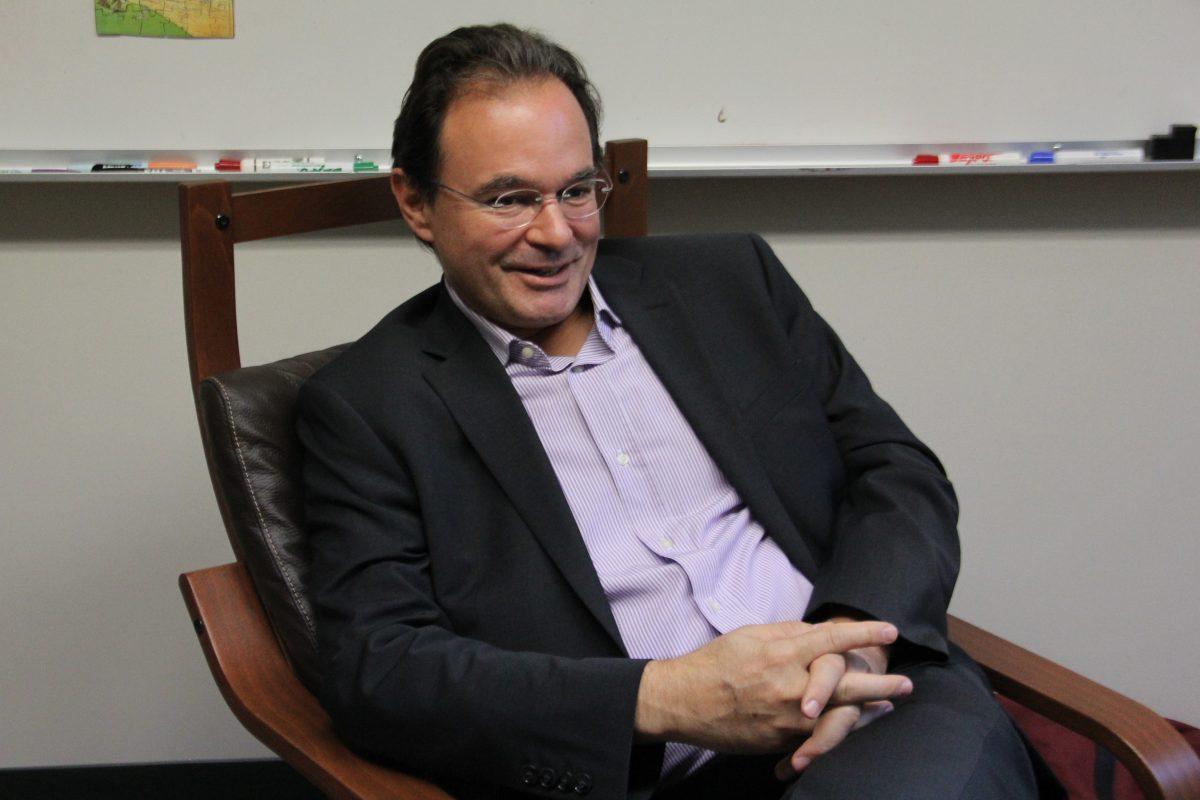Danni Ondraskova: Your book was written in May 2016. The British people voted for Brexit one month later. How have you seen the event influence the domestic political situation in Greece, particularly with Alexis Tsipras and the populist Coalition of the Radical Left (SYRIZA) and right-wing populist Independent Greeks (ANEL) parties in power in the Hellenic Parliament?
George Papaconstantinou: Actually, I wouldn’t say that it influenced it directly much. I think that the Brexit result arose from a different set of circumstances, though it did reflect trends that are common in many countries. It did reinforce the position of some people who want Greece to exit from the Eurozone. But there are very few people, mostly from the Communist Party and the neo-Nazis, who would like to see Greece outside the European Union. So it was interpreted as an antiestablishment vote, but didn’t fit in very well within the Greek political debate.
DO: You write at the very end of your book:
We will choose populists over realists any time – the former are visionary, the latter cold technocrats. We admire those tilting at windmills and when they fail, as they inevitably do, we think, “at least they tried.” Well, I am tired of losing after having fought the good fight. I am tired of pleading for “a conspiracy of common sense” to replace all the conspiracies that have infected people’s minds and collectively held us back. I want my country to win.
As you know, populists with anti-EU (European Union) sentiments assumed power in many countries’ parliaments beyond Greece this year, particularly in Eastern Europe and to an extent its western counterpart. In the US, Donald Trump won the Republican nomination and Bernie Sanders put up a surprisingly strong fight again Hillary Clinton in the Democratic primary. What do you think are some ways citizens and governments can douse the flames of populism while addressing people’s legitimate concerns about politicians being overly beholden to the rich?
GP: Populism reflects some reality on the ground but also partly attitudes that go way beyond the reality. There is a reality, which is that globalization and technology produce a very lopsided economic paradigm, where we have few very winners and many people who lose out of the process. But a big part of populism goes way beyond that. If you look at the Brexit results, some of the parts of England that voted overwhelmingly for Brexit were those where there is hardly any immigration or non-English people. So perception beyond the real concerns that are there makes for a very explosive political environment in which evidence-based policymaking loses out to emotions-based policymaking.
The response to populism needs to be on two levels. One is that we need to address some of the real issues: unemployment and rising inequality. And that’s what feeds populism. It is there, and we have to deal with it. The other part, of course, is that we need to somehow change the language of political discourse, because it’s clear that populists have used very simple-minded emotional arguments, but the difficulty for those of us who are not populists is that our arguments are much more complicated, because reality is complicated. Our arguments are often put in language that is too cold and technocratic, and we somehow need to reinvent a language to approach people and speak to them in a way that goes back to basic values. You have to approach them in a different way than simply talking about why policy x is better than policy y. You see that in the U.S. presidential election, where Hillary Clinton is trying to use that kind of language. I think in the US, you’ve always had more of this emotional appeal to the voters than in many European countries. That is one way of approaching and combatting populism, but you also need to work on the real causes.
DO: Throughout your book, you acknowledged how much of the fault for the Greek debt crisis can be placed on the conservative New Democracy (ND)-led government of Kostas Karamanlis, which did not take advantage of Greece’s status as the Eurozone’s fastest-growing economy, failed to address underlying problems in Greece’s economic and financial institutions, and endured corruption scandals in the mid-2000s. But you also criticize the Eurozone’s monitoring framework for not picking up systemic risks in Greece and the Eurozone as a whole in time. Your prologue describes the Greek crisis as “about politicians who tried in vain to understand and outsmart markets, and markets that proved how myopic they are, but also exposed failings in political systems.” Are there still systemic failings in the Eurozone and EU itself that threaten their existence? How can they be addressed, and by whom?
GP: The failings are there to a large extent. The Eurozone construct was a great leap forward. However, for it to take shape, a number of compromises were made to get countries like Germany in, which did not want to trade the deutschemark for the euro. Unfortunately, after the Eurozone construction, which was clearly in retrospect incomplete and faulty, everyone fell asleep at the wheel. That includes policymakers, who did not realize that it could not just coast on the lower interest rates. You also needed to undertake structural reforms and make sure that European economies were competitive in world markets. But also markets themselves fell asleep, and were content to lend to Greece at very low interest rates close to Germany’s. This could not last. Of course, it’s much easier to see this ex-post; at the time, people thought this was going to last forever. It did not. So that’s how Greece and other countries crashed.
Have we fixed the institutional infrastructure? The answer is that we’ve made inroads to doing that. For example, there was a movement towards a banking union. But we’re not there yet. We don’t have a full Europe-wide deposit guarantee so that the money doesn’t flow from the weaker to the stronger countries. We made some movement to a fiscal union, but again, we’re not there yet. We don’t have a European budget. And the worst thing is that as important as these moves have been, though timid compared to what they should be, the political reality of the moment is not really conducive to a closer union that integrates the countries. The politics goes in one direction that is much more nationalist and isolationist, whereas the economics tells you that for this construction to survive, you need to go toward integration. In that sense, you can’t be terribly optimistic.
DO: The refugee crisis is also not helping with the political situation.
GP: The refugee crisis is a problem in and of itself. It is a humanitarian disaster in terms of the outflow from the affected areas. It is clearly producing a very imperfect response from Europe that is not really true to its values and in an attempt to cobble together a solution, which is straining the relationship between richer and poorer countries even more, between the center and the periphery. So it’s an additional complication that makes things much worse.
DO: You discuss having to conduct a Faustian bargain in which you sign a deal that saves Greece from bankruptcy but elicits anger from Greek citizens seeing their government services and pensions slashed. As other countries in Europe, for example in the Mediterranean region, likely face a similar situation in the future, what advice would you offer them to avoid the mistakes you and the center-left Panhellenic Socialist Movement (PASOK) made from 2009-2011?
GP: I don’t know if I would talk about lessons, but there are certain conclusions one can draw from this period. Some are very basic ones. One conclusion that I write about in the book is that eventually, things tend to catch up with you. If you live in a state that has weak institutions and don’t strengthen them, allow fiscal laxity for a long time, and have a political system that is more self-serving than trying to serve its citizens, sooner rather than later, it does tend to crash on top of you. And when it does, it’s very costly and you don’t have time to react. Working ex ante to prevent such circumstances is the best advice one can give. Structural reforms to make markets more competitive, make the state more attuned to its citizens’ needs, and make sure the productive structure of the economy’s not dependent on purely lending from abroad and imports like ours are examples. This is a very simple lesson, which of course requires more than anything a political system that sees beyond the next electoral cycle. That’s a big thing to ask from politicians.
DO: Your book discussed how the roots of the Greek crisis go back in time. Prime Minister Papandreou “talked of another deficit, one that was turning out to be more important and more corrosive than the fiscal deficit or the competitiveness deficit: a deficit of values and institutions.” Where does this deficit of values and institutions come from? How much of a role does Greek history play?
GP: I certainly do not think there is anything in the Greek DNA that suggests Greeks are not capable of creating a normal modern state. But we do have a tradition of weak institutions, which can be traced to the way the political system operates. We are a young democracy, and it is a democracy that for a long time has been taken hostage by special interests or by political rulers. You need time to fix institutions and I do hope that this crisis acts as a wakeup call to fix the government itself, public administration, the judiciary, media, the kind of pillars of society which ensure that there is no abuse of power, that there is transparency, that you serve the public interests and not your personal interests in politics. These are not uniquely Greek problems, but in other countries you are often able to earlier catch the problem before it explodes because these countervailing powers work much better than in Greece.
DO: Your book discusses a challenge you had as finance minister when trying to convince the markets and EU governments of Greece’s potential to recover from its crisis: the “double argument” that even if the necessary austerity reforms are made, economic growth is still stunted and the government would collapse from public protests. Does that unwinnable situation still hold today?
GP: Greece has been in a 7-year recession and lost a quarter of its output. There are a number of preconditions for recovery and robust growth. One is political stability, which I don’t believe the current government can give. The second is some additional debt relief and lower primary surpluses to let the economy breathe a little bit. And the third one is some more work on institution building, which will convince the rest of the world, particularly investors, that Greece is worth investing in. If these three things happen, I think we can see a quick uptake and the economy start to grow on a much more viable basis than before.
DO: One of the focal points of your book was an explanation about what it was like to be “the most hated man in Greece.” What helped you go through times like the violent protests in front of the Parliament, encounters you had with Greek citizens when your memorandum was implemented, and being replaced as finance minister?
GP: When you are dealt particular cards, you just have to play what you’ve got. This was an honor and huge responsibility to be given this particular task as finance minister. To say that it has been easy would obviously not be the truth. In those circumstances, you rely on your family a lot to be able to go through this, and I did. I have a very strong wife and two kids that were following this as teenagers and were very concerned. I tried to explain things so that they’d know exactly what was going on. And then one of your biggest sources of strength is believing that you are actually doing the right thing, and that allows you to—certainly not ignore, because it touches you, the kinds of reactions that you mentioned—be able to cope.
DO: You discuss in the first part of your book your decision to join the parliament and subsequently took the “hardest job in Europe” as the Greek finance minister despite not being a career politician. What advice do you have for Wellesley College students interested in going into politics, a field you call in your prologue “nasty, brutish, and short?”
GP: Wellesley College has a tradition of public service and will hopefully have an alumna as the next President of the United States, so I wouldn’t presume to be the one to give advice to Wellesley students when they have role models that are much closer to home. And I would like to think that experiences such as mine do not discourage people from entering public service. I would do it again if I had to, despite the difficulties that I faced. If we let public service be run by people who do not have the same starting point, ideals, and attitudes, then we’d all be worse off.




